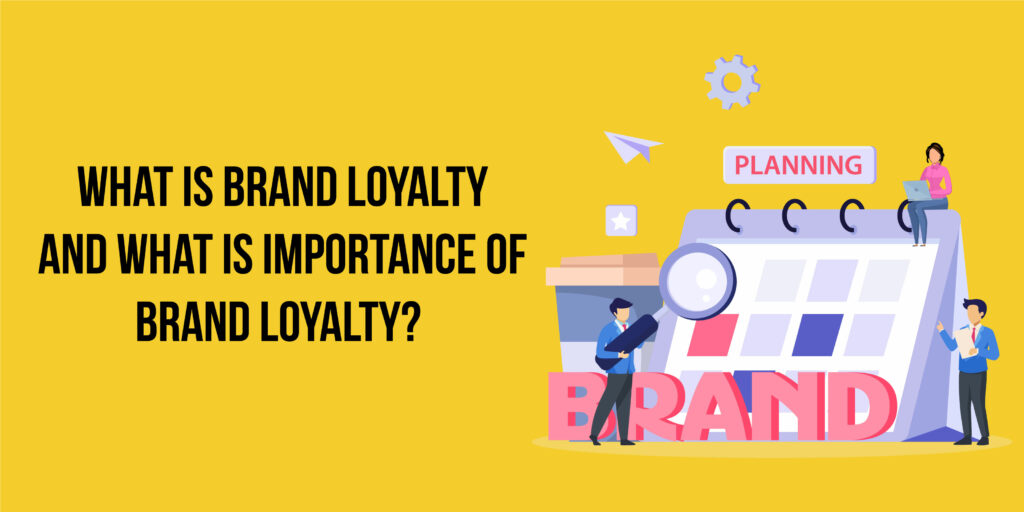
What is Brand Loyalty and What is the Importance of Brand Loyalty?
Introduction
In a world inundated with choices, brand loyalty emerges as the silent force shaping our preferences and decisions. In this exploration, we unravel the intricate tapestry of what brand loyalty truly entails and why it stands as a cornerstone in the edifice of successful businesses.
Brand loyalty is more than just a repeated purchase; it’s a symbiotic relationship between consumers and brands, built on trust, consistency, and shared values. As we delve deeper, we’ll navigate the nuances of this intricate dance between buyers and brands, understanding the psychology that transforms a product into a symbol of identity.
But why does brand loyalty matter in the grand scheme of business dynamics? The answer lies in the profound impact it has on customer retention, advocacy, and the bottom line. Let read ahead as we dissect the importance of brand loyalty in a competitive landscape, where the cacophony of choices can either drown a brand or elevate it to a coveted status.
What is brand loyalty?
Brand loyalty is a consumer’s steadfast commitment to a particular brand, often stemming from positive experiences, trust, and a consistent fulfillment of expectations. It goes beyond mere repeat purchases, encompassing a deep emotional connection and a willingness to choose that brand over competitors. Successful brand loyalty is built on a foundation of quality, reliability, and a brand’s ability to resonate with its audience on a personal level.
What is the importance of brand loyalty?
Brand loyalty holds significant value in the business landscape, influencing various aspects that contribute to sustained success.
1. Customer Retention:
Establishes a bond that goes beyond transactions, reducing the likelihood of customers switching to competitors. It leads to repeat business from loyal customers, becoming a consistent revenue stream.
2. Trust and Credibility:
Fosters trust as consumers rely on familiar brands, knowing what to expect in terms of quality and performance. This enhances a brand’s credibility, as loyal customers become advocates, influencing others through positive word-of-mouth.
3. Competitive Advantage:
Acts as a barrier to entry for competitors, as building a loyal customer base takes time and consistent effort. Brands with loyal customers are better positioned to weather market fluctuations.
4. Pricing Flexibility:
Loyal customers often exhibit a higher tolerance for price increases, allowing brands to adjust pricing strategies without risking significant customer loss.
5. Cost-Efficiency in Marketing:
Marketing efforts become more efficient, as retaining existing customers is generally more cost-effective than acquiring new ones. Loyal customers may actively engage with the brand, reducing the need for extensive promotional campaigns.
6. Product and Service Feedback:
Loyal customers are more likely to provide constructive feedback, enabling the brand to refine products or services based on valuable insights.
This feedback loop contributes to continuous improvement and innovation.
7. Emotional Connection:
Builds an emotional connection between the brand and its customers, creating a sense of belonging and shared values.
Emotional bonds enhance brand resilience during challenges, as customers may remain loyal even in the face of temporary setbacks.
8. Cross-Selling Opportunities:
Loyal customers are receptive to new offerings from a trusted brand, providing opportunities for successful cross-selling or upselling initiatives.
In essence, brand loyalty is not just a metric; it’s a strategic asset that bolsters a brand’s resilience, growth, and overall market position.
Why is brand loyalty in marketing important?<h3>
Brand loyalty in marketing is crucial because it creates repeat customers who are more likely to stick with a familiar and trusted brand. It also can lead to positive word-of-mouth, attracting new customers through recommendations. Building strong connections with customers fosters a sense of trust and reliability, contributing to long-term success for businesses.
How to build brand loyalty through marketing?
In today’s competitive market, establishing brand loyalty is crucial for long-term success. This blog will explore effective strategies to build and nurture brand loyalty through targeted marketing efforts.
1. Understanding Your Audience:
Identify and analyze your target audience to tailor marketing campaigns that resonate with their needs and preferences. This foundational step ensures your brand message connects on a personal level.
2. Consistent Branding Across Channels:
Maintain a cohesive brand identity across all marketing channels. Consistency fosters trust and familiarity, reinforcing the emotional connection customers have with your brand.
3. Authentic Storytelling:
Craft compelling narratives that reflect your brand’s values and mission. Authentic storytelling creates an emotional bond, making customers feel more than just consumers but part of a shared journey.
4. Loyalty Programs and Rewards:
Implementing loyalty programs incentivizes repeat business. Offer exclusive rewards, discounts, or early access to loyal customers, showing appreciation for their continued support.
5. Exceptional Customer Service:
Providing outstanding customer service is a cornerstone of brand loyalty. Promptly address concerns, actively listen to feedback, and go the extra mile to exceed customer expectations.
6. Social Media Engagement:
Leverage social media platforms to engage with your audience. Foster a sense of community by encouraging user-generated content, responding to comments, and sharing behind-the-scenes glimpses of your brand.
7. Personalized Marketing:
Utilize data-driven insights to personalize marketing messages. Tailor promotions and recommendations based on customer preferences, creating a more personalized and relevant experience.
8. Quality Products and Services:
Consistently deliver high-quality products or services. Customer satisfaction is a fundamental driver of loyalty, and providing value ensures customers return and recommend your brand.
9. Emotional Branding:
Evoke emotions through your marketing efforts. Whether it’s humor, nostalgia, or empathy, emotional connections leave a lasting impact and contribute to a memorable brand experience.
10. Community Involvement:
Engage in community initiatives and socially responsible practices. Demonstrating a commitment to making a positive impact fosters goodwill and strengthens the emotional connection customers have with your brand.
Conclusion:
Building brand loyalty is an ongoing process that requires a strategic and multi-faceted approach. By understanding your audience, maintaining consistency, and fostering emotional connections, your brand can cultivate a loyal customer base that stands the test of time.
FAQs
1. What are the 5 characteristics of brand loyalty?
Characteristics of Brand Loyalty:
Repeat Purchases: Loyal customers consistently choose a particular brand over others.
Positive Word-of-mouth: Loyal customers often recommend the brand to others.
Emotional Connection: Strong emotional ties between customers and the brand contribute to loyalty.
Resistance to Competitor Influences: Loyal customers are less likely to switch to competitors.
Willingness to Pay Premium: Loyal customers may be willing to pay more for the brand they trust.
2. Why is loyalty important to a brand?
Importance of Loyalty to a Brand:
Revenue Stability: Loyal customers provide a steady revenue stream through repeat business.
Cost Savings: It’s generally more cost-effective to retain existing customers than acquire new ones.
Brand Advocacy: Loyal customers become brand advocates, attracting new customers through positive word-of-mouth.
Competitive Edge: Brand loyalty can differentiate a business in a competitive market.
What are examples of brand loyalty?
3. What are examples of brand loyalty? What are examples of brand loyalty?
Woop: Customers often exhibit strong loyalty to Woop as it is meant for people of all ages. The Surat-based entertainment hub also offers exciting offers that combine the urge to play, eat, and have fun.
Nike: Fans of Nike frequently remain loyal due to the brand’s image, quality, and innovation.
Starbucks: Many customers exhibit loyalty by regularly choosing Starbucks for their coffee preferences.
These factors collectively contribute to the enduring success and sustainability of a brand.



